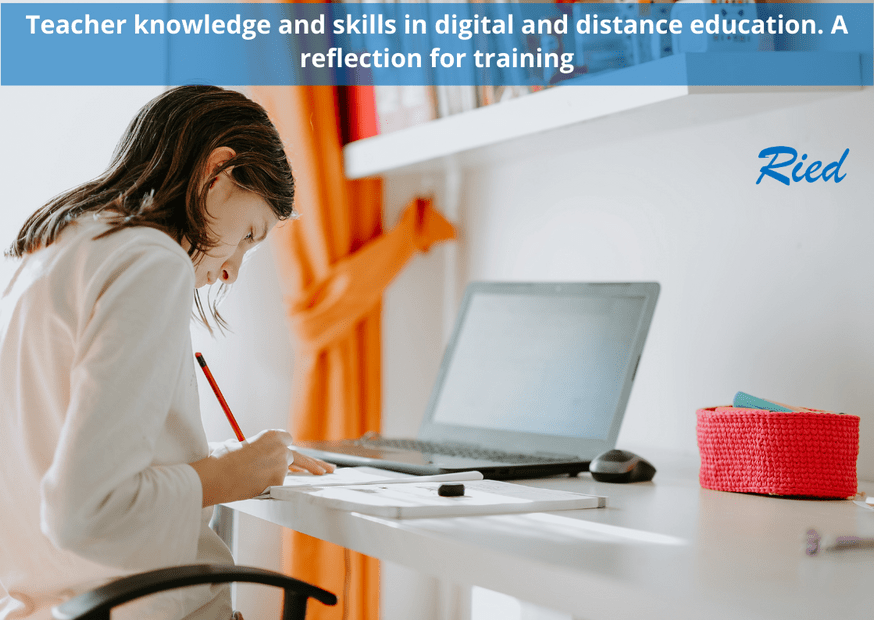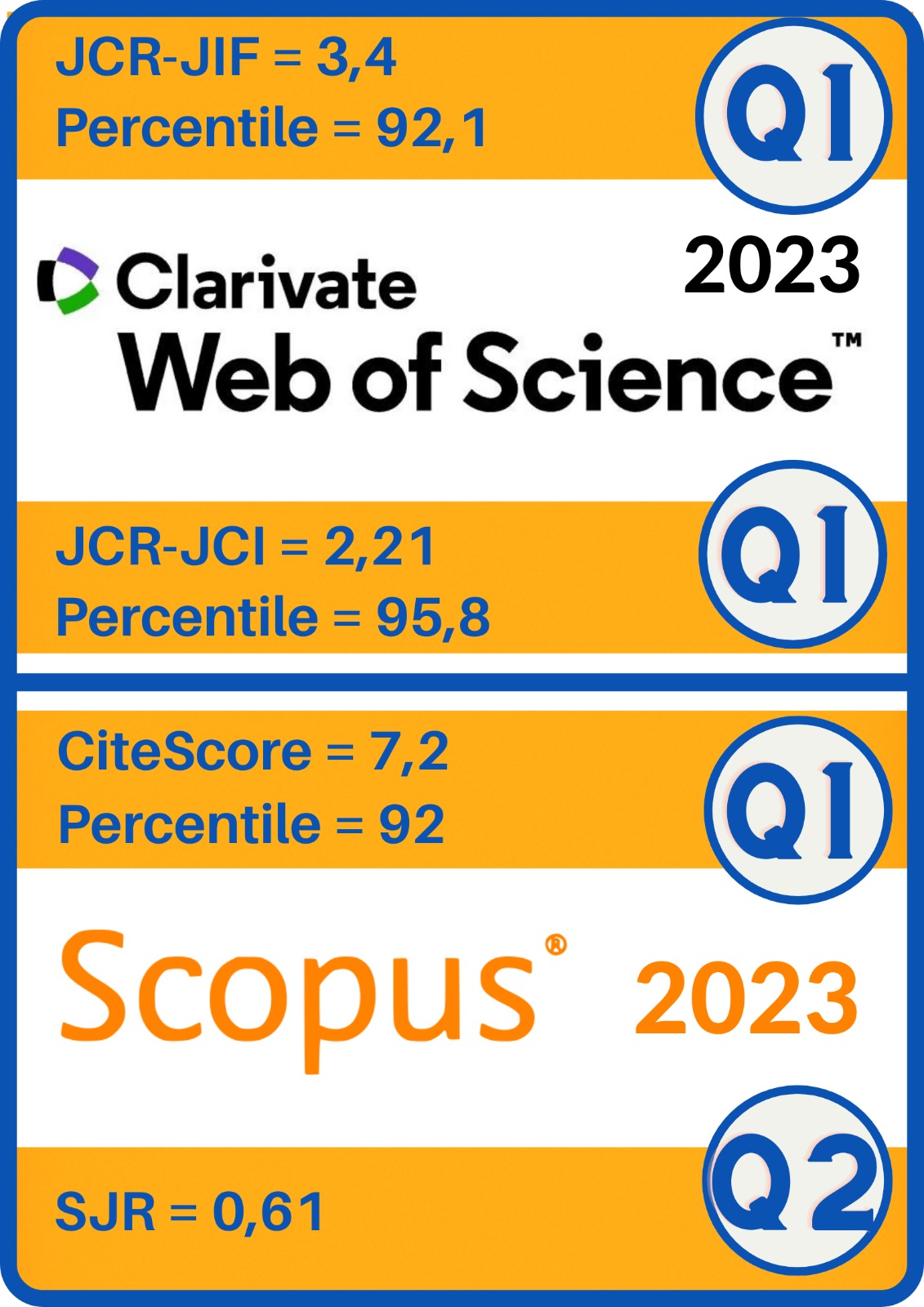Teacher knowledge and skills in digital and distance education. A reflection for training
DOI:
https://doi.org/10.5944/ried.23.2.26540Keywords:
distance education, scientific, theoretical, technical and practical knowledge, epistemological, pedagogical, technological and research skills.Abstract
This work intends to articulate the study and scientific research, in order to generate theories consistent with the educational practice and technical procedures put into action for the purpose of greater consistency, quality and, therefore, credibility to non-face-to-face educational formats. Thus, we discuss a brief delimitation on the different parameters of knowledge in the educational field, to propose afterwards, by looking into their relationships, the commitments and skills that teachers of this modality -above all those in higher educational levels- should integrate into their professional knowledge. Consequently, the four most relevant aspects of knowledge in education -scientific, theoretical, technical and practical knowledge, and the intersections between them- are described leading to the commitments and skills of higher education teachers who work in non-face-to-face educational formats. We conclude that these commitments would be of a professional, ethical, formative, collaborative and management nature. In this framework, the areas of teaching skills covering these four aspects would be included: a) subject competence (subject or discipline taught), b) pedagogical competence (methodology, communication, tutoring, evaluation, etc.), c) technological competence (applied to the subject, pedagogy and research), and d) research and innovation competence (applied, in turn, to the epistemological, pedagogical and technological fields). In sum, a holistic reflection on teacher training.
Downloads
References
Alamri, A., y Tyler-Wood, T. (2017). Factors Affecting Learners with Disabilities Instructor Interaction in Online Learning. Journal of Special Education Technology, 32(2), 59-69. https://doi.org/10.1177/0162643416681497
Bautista, G., Borges, F., y Forés, A. (2006). Didáctica universitaria en entornos virtuales de enseñanza-aprendizaje. Madrid: Narcea.
Bawane, J., y Spector, J. (2009). Prioritization of online instructor roles: Implications for competency-based teacher education programs. Distance Education, 30(3), 383-397.
Cabero, J. (2014a). La formación del profesorado en TIC: Modelo TPACK (conocimiento tecnológico, pedagógico y de contenido). Sevilla: Secretariado de Recursos Audiovisuales y Nuevas Tecnologías de la Universidad de Sevilla.
Cabero, J. (2014b). Formación del profesorado universitario en TIC. Aplicación del método Delphi para la selección de los contenidos formativos. Educación XX1, 17(1), 109-132. https://doi.org/10.5944/educxx1.17.1.10707
Cabero-Almenara, J., Roig-Vila, R., y Mengual-Andrés, S. (2017). Conocimientos tecnológicos, pedagógicos y disciplinares de los futuros docentes según el modelo TPACK. Digital Education Review, 32, 73-84. Recuperado de http://revistes.ub.edu/index.php/der/arti-cle/view/16981
Cejas, R., Navío, A., y Barroso, J. (2016). Las competencias del profesorado universitario desde el modelo TPACK (conocimiento tecnológico y pedagógico del contenido). Píxel-Bit. Revista de Medios y Educación, 49, 105-119. http://dx.doi.org/10.12795/pixel-bit.2016.i49.07
Clarà, M., y Mauri, T. (2010). El Conocimiento práctico. Cuatro conceptualizaciones constructivistas de las relaciones entre conocimiento teórico y práctica educativa. Infancia y Aprendizaje, 33(2), 131-141.
Coll, C., Onrubia, J., y Mauri, T. (2008). Ayudar a aprender en contextos educativos: el ejercicio de la influencia educativa y el análisis de la enseñanza. Revista de Educación, 364, 33-70.
Deng, F., Sing, Ch., So, H-J., Qian, Y., y Chen, L. (2017). Examining the validity of the Technological Pedagogical Content Knowledge (TPACK) framework for preservice chemistry teachers. Australasian Journal of Educational Technology, 33(3), 1-14.
Durán, M., Gutiérrez, I., y Prendes, M. P. (2016). Análisis conceptual de modelos de competencia digital del profesorado universitario. RELATEC Revista Latinoamericana de Tecnología Educativa, 15(1), 97-114. https://doi.org/10.17398/1695288X.15.1.97
Galán, A., González, M. A., y Román, M. (2012). La irrupción del factor comunitario en el perfil del profesor universitario. Bordon, 64(3), 133-148.
García Aretio, L. (2001). La educación a distancia, de la teoría a la práctica. Barcelona: Ariel.
García Aretio, L. (2014). Bases, mediaciones y futuro de la educación a distancia en la sociedad digital. Madrid: Síntesis.
García Aretio, L. (2017). Educación a distancia y virtual: calidad, disrupción, aprendizajes adaptativo y móvil. RIED. Revista Iberoamericana de Educación a Distancia, 20(2), 9-25. https://doi.org/10.5944/ried.20.2.18737
Henz, H. (1968). Tratado de Pedagogía sistemática. Barcelona: Herder.
Hu, H-W., Walker, K., y Hsiao, W-Y. (2013). Developing elementary pre-service teachers’ technological, pedagogical, and content knowledge for learning and teaching division of fractions. International Journal of Technology, Knowledge and Society, 9(2),185-204. https://doi.org/10.18848/1832-3669/CGP/v09i02/56380
Hubert, R. (1977). Tratado de Pedagogía general. Buenos Aires: El Ateneo.
Koehler, M. J., y Mishra, P. (2008). Introducing technological pedagogical knowledge. In AACTE (Eds.), The handbook of technological pedagogical content knowledge for educators (pp. 3-28). New York: Routledge, Taylor & Francis Group.
Krumsvik, R. J. (2012). Teacher educators’ digital competence. Scandinavian Journal of Educational Research, 58(3), 269-280. https://doi.org/10.1080/00313831.2012.726273
Llorente, M. C., Cabero, J., y Barroso, J. (2015). El papel del profesorado y alumnado en los nuevos entornos tecnológicos. En J. Cabero y J. Barroso (Eds.), Nuevos retos en tecnología educativa (217-236). Madrid: Síntesis.
Mas, O. (2012). Las competencias del docente universitario/: la percepción del alumno, de los expertos y del propio protagonista. REDU Revista de Docencia Universitaria, 10(2), 299-318.
Medina, R, (1981). La diversidad de niveles de acceso al conocimiento de los fenómenos educativos. Aula abierta, 32.
Medina, R., Rodríguez, T., y García-Aretio, L. (1992). Teoría de la educación. Madrid: UNED.
Mishra, P., y Koehler, J. (2006). Technological Pedagogical Content Knowledge: A new framework for teacher knowledge. Teachers College Record, 108(6), 1017-1054. doi: 10.1111/j.1467-9620.2006.00684.x.
Monereo, C., y Domínguez, C. (2014). La identidad docente de los profesores universitarios competentes. Educación XX1, 17(2), 83-104. http://doi.org/10.5944/educxx1.17.2.11480
Nassif, R. (1985). Teoría de la educación. Madrid: Cincel.
Popper, K. (1962). La lógica de la investigación científica. Madrid: Tecnos.
Rienties, B., Brouwer, N., Carbonell, K. B., Townsend, D., Rozendal, A-P., Loo, J., Dekker, P. y Lygo-Baker, S. (2013). Online training of TPACK skills of higher education scholars: A cross-institutional impactstudy. European Journal of Teacher Education, 36(4), 480-495. https://doi.org/10.1080/02619768.2013.801073
Rodríguez, A., Prieto, M., y Vázquez, R. (2014). El uso de las TIC en la formación permanente del profesorado para la mejora de su práctica docente. Etic@ Net, I, http://dx.doi.org/10.12795/pixelbit.2016.i49.07
Schön, D. A. (1998). El profesional reflexivo. Cómo piensan los profesionales cuando actúan. Barcelona: Ediciones Paidós Ibérica, S.A.
Schulman, L. S. (1986). Those who understand: knowledge growth in teaching. Educational Researcher, 15(2), 1-22.
Tejada, J. (2014). Formando formadores: nuevos escenarios y competencias digitales docentes. En V. Marín (Coord.), El hoy y el mañana junto a las TIC. (94-154). Sevilla: Universidad de Sevilla.
Tomàs, M., Castro, D., y Feixas, M. (2012). Tensiones entre las funciones docente e investigadora del profesorado en la universidad. Revista de docencia universitaria. REDU, 10(1), 343-367.
Tomàs, M. e Ion, G. (2008). Contrastando dos modelos de análisis de la cultura organizativa de la universidad. Bordón, 60(3), 131-147.
Torra, I., Corral, I., Pérez, M., Pagès, T., Valderrama, E., Màrquez, M., Sabaté, S., Solà, P., Hernàndez, C., Sangrà, A., Guàrdia, L., Estebanell, M., Patiño, J., González, À., Fandos, M., Ruiz, N., Iglesias, M., Tena, A., y Triadó, X. (2012). Identificación de competencias docentes que orienten el desarrollo de planes de formación dirigidos a profesorado universitario. REDU. Revista de Docencia Universitaria, 10(2), 21-56. https://doi.org/10.4995/redu.2012.6096
Vergara, C., y Cofré, H. (2014). Conocimiento Pedagógico del Contenido: ¿el paradigma perdido en la formación inicial y continua de profesores en Chile? Estudios Pedagógicos, XL, 323-338. http://doi.org/10.4067/S0718-07052014000200019
Zabalza, M. A. (2003). Las competencias docentes del profesorado universitario. Calidad y desarrollo profesional. Madrid: Narcea.

Published
How to Cite
Issue
Section
License
Copyright (c) 2020 RIED. Revista Iberoamericana de Educación a Distancia

This work is licensed under a Creative Commons Attribution 4.0 International License.
The articles that are published in this journal are subject to the following terms:
1. The authors grant the exploitation rights of the work accepted for publication to RIED, guarantee to the journal the right to be the first publication of research understaken and permit the journal to distribute the work published under the license indicated in point 2.
2. The articles are published in the electronic edition of the journal under a Creative Commons Attribution 4.0 International (CC BY 4.0) license. You can copy and redistribute the material in any medium or format, adapt, remix, transform, and build upon the material for any purpose, even commercially. You must give appropriate credit, provide a link to the license, and indicate if changes were made. You may do so in any reasonable manner, but not in any way that suggests the licensor endorses you or your use.
3. Conditions for self-archiving. Authors are encouraged to disseminate electronically the OnlineFirst version (assessed version and accepted for publication) of its articles before publication, always with reference to its publication by RIED, favoring its circulation and dissemination earlier and with this a possible increase in its citation and reach among the academic community.







